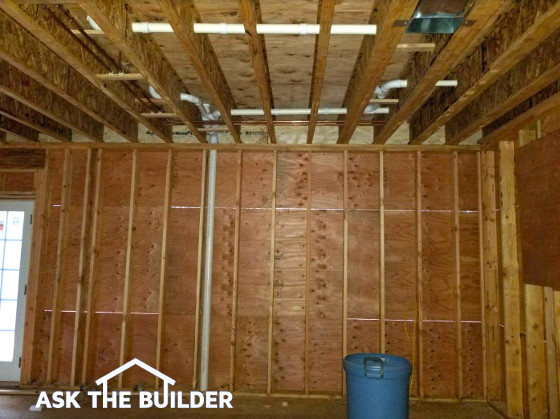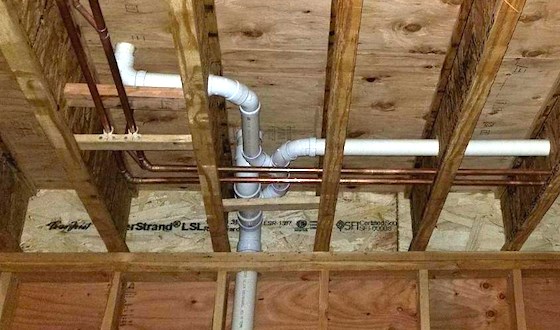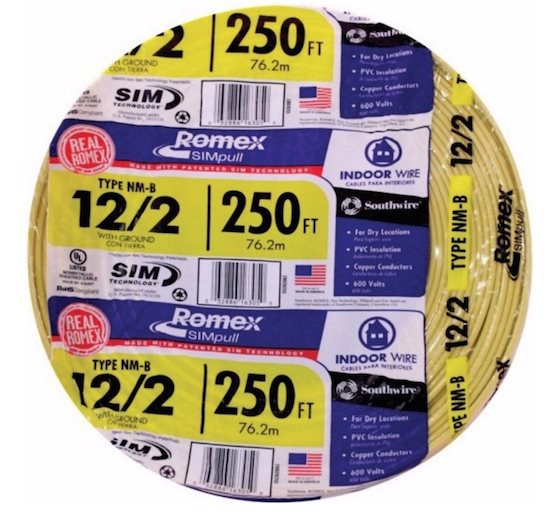Doing Due Diligence

When you hope your builder and subs do everything right, you’re making a huge mistake. (C) Copyright 2018 Tim Carter
Doing Due Diligence Story
I discovered years ago that you like stories and hate to be lectured to. Stories can be fun and intriguing. Lectures tend to make your brain hurt. I’ve got a story for you that I think you’ll really enjoy. It’s been unfolding over the past eight weeks with a random visitor that stumbled onto my AsktheBuilder.com website.
This story is about hope. Hope is an emotion you experience when you wish for things you can’t control. For example, you hope you’ll get rescued from a deserted island. You hope the weather will be nice for your vacation.
But you should never ever hope that everything in your new home is going to be done the best possible way or to the highest level you can afford. Some upgrades cost very little extra money but pay huge dividends down the road. One of these is cast iron drain pipe.
Building a New Home in New Jersey
The visitor who showed up at my website is a professional who’s building a new home in New Jersey. Like thousands and thousands of others who build new homes each year, he undoubtedly thought he had done his homework and hired a knowledgeable builder who’d do every aspect of the job the right way.
That’s where the trouble begins. What’s the right way?
The Building Code Is a Set of Minimum Standards
Often you’ll hear builders or others say something’s built to “code” or everything in the house passes all the building inspections. BWAHAHAHAHAHAHAHA!
The building code is a set of minimum standards. If your home passes all the inspections, it’s like getting a 70 percent on a test. You just passed by the skin of your teeth. You can always build something to a much higher standard than the building code mandates.
The man building the home in New Jersey used my Ask Tim page and asked me a fairly complex question. I developed a phone consulting product a long time ago for these situations where back-and-forth questions and answers are required to offer the best advice. He was overjoyed to discover he and I could talk on the phone.
His first questions were about the strength of the concrete being used in the footings, foundation walls, and his basement slab.

Here's a foundation footing that's making a transition from one level to another. It's poured continuously for extra strength. Copyright 2018 Tim Carter
I gave him all the answers and told him that they were in past columns on my website he could read for free. He told me he’s so busy he doesn’t have time to sort through all the information and would rather just talk to me.
A week later, the homeowner wanted to discuss gaps in the plywood wall sheathing that covered the exterior walls. Then a week later, he wanted to talk about how the walls were joined together.
PVC Plumbing Pipes are Noisy
Every week a new set of questions came up about whatever work had just been installed. Just this past weekend, he sent me photos of the PVC plumbing drain pipes that had been installed. After reading a past column on my website, he became very concerned that he was going to hear lots of rushing water noise in the pipes.

These are some of the PVC drain pipes the homeowner thought would make noise. He was right! Copyright 2018 Tim Carter
I’ve been a master plumber since age 29 and can tell you that PVC is a great piping material because it doesn’t rust or develop cracks. But its shortcoming is that it’s very noisy. When water rushes out of a toilet and cascades down a vertical drain stack in a wall, you’d think you’re living under Niagara Falls. This rushing-water noise is horrible and it’s preventable.
Soundproofing PVC Pipe Options
This homeowner didn’t want to hear any noise and asked me how to stop it. I told him that the pipes can be covered with a foam sleeve, sound-deadening fiberglass batts could be placed in the wall and ceiling cavities and the sound-deadening board could be nailed to the wall studs and ceiling joists before the drywall was installed.
Or, he could remove as much of the larger-diameter 3-inch drains as possible and replace them with no-hub cast iron pipe. This is what should have been installed in the first place. It’s very expensive to try to correct the problem, but not so expensive to install noise-proof cast iron.
Related Links
Cast Iron Drain Lines Are Fantastic
Insulate PVC To Stop Sound? May Be Cheaper To Start with Cast Iron!!
Free & Fast Bids
CLICK HERE to get FREE & FAST BIDS from local plumbers who can install cast iron drains for you.
One wonders why many builders don’t mimic car manufacturers. Builders are keenly aware of the different model levels of pickup trucks today. You can buy a basic pickup truck or one that’s got every option and the plushest interior you could ever imagine. Of course, you pay more for the better things, but if the buyer wants it, then sell it to her/him.
You Must Do Due Diligence, Sorry!
This homeowner hoped that the builder would automatically build the home to the highest standards. Unfortunately, that’s not how it works. It’s up to you to determine what the best is. You need to do your due diligence. You need to do the research and find out how to avoid all the pesky problems that await you a month after you move into your new home.
Electric Wiring Tip
Fortunately, I was able to give this homeowner a few tips about his electric system as the wiring had not been installed. I told him that he should consider installing nothing less than 12 gauge wire in all normal house circuits. This wire only costs (2018 prices) $25 more per 250 feet. The cost of the circuit breaker for this wire is the same as for thinner 14-gauge wire.

This is a standard roll of 12-gauge wire used in residential homes. CLICK the image and compare how much a 250-foot roll of 14/2 wire costs. You'll be BLOWN AWAY. Always use 12/2 wire!
The advantage to using 12-gauge wire is it’s rated for 20 amps instead of 15. There are lots of reasons you’ll appreciate this extra capacity on a circuit. I also told him to make sure there’s plenty of exterior outlets in strategic locations for holiday lighting. All of these should be controlled with indoor switches.
CLICK HERE to get FREE & FAST BIDS from local electricians who can install 12-gauge wire for you!
I could go on and on and on about the best things for a home. Maybe I should write a book about them. What do you think?
Go down to the comments below and type "Yes, write the book!" If enough ask for it, I’ll do it for you.
Column 1236
58 Responses to Doing Due Diligence